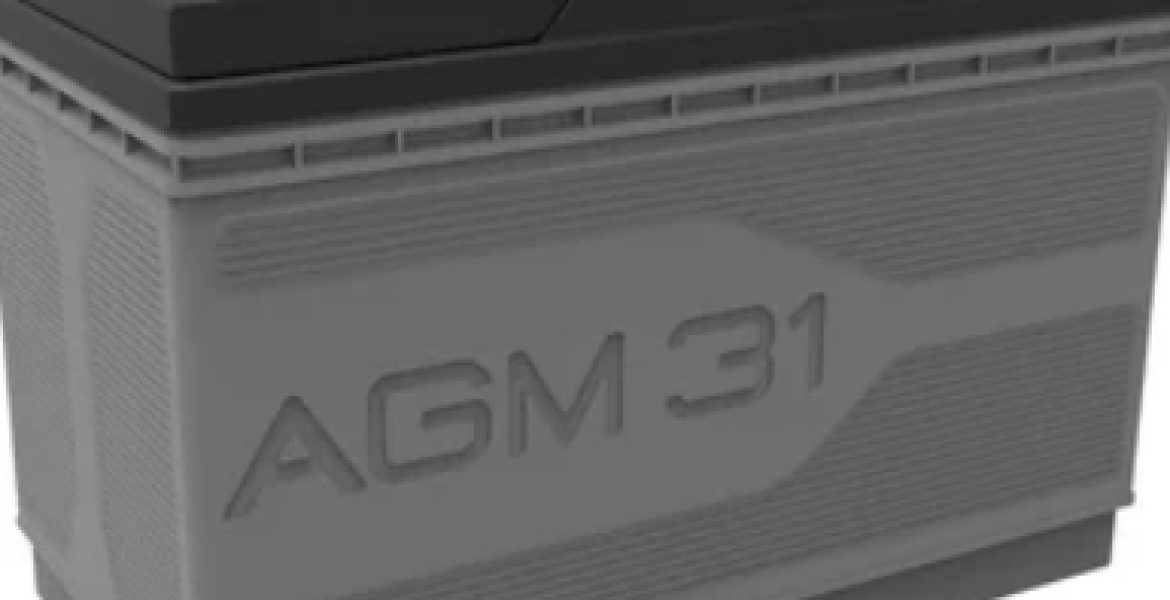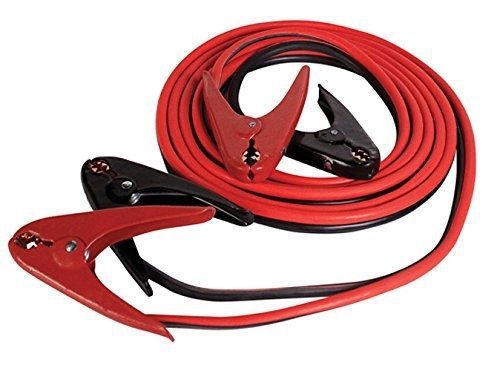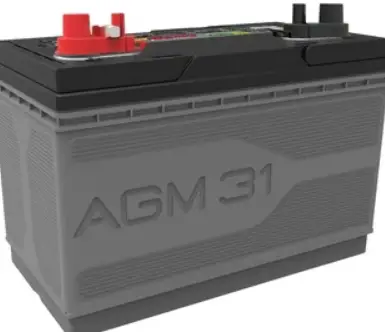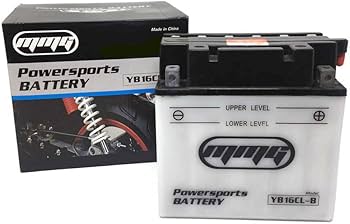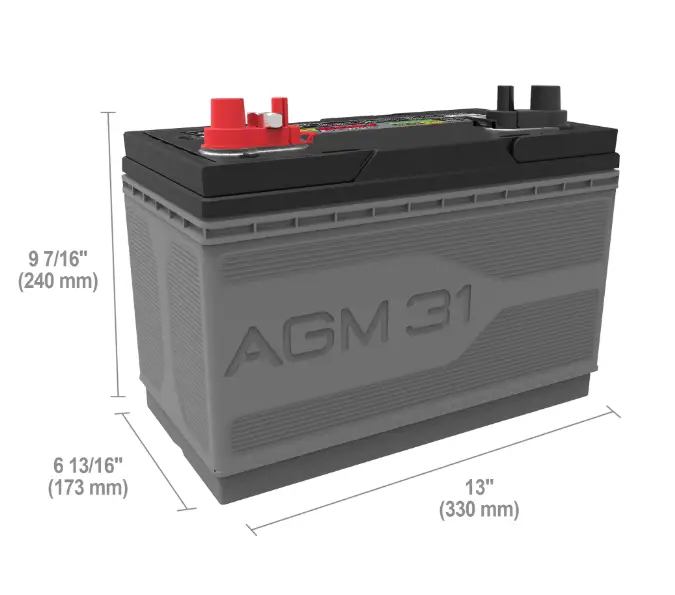
EverStart Platinum BOXED AGM Marine and RV Deep Cycle Battery, Group Size 31M 12 Volt, 1030 MCA
- Ship straight to home
- Absorbent Glass Mat (AGM) technology
- Marine cranking amps: 1030
- Reserve capacity: 200 minutes
- Free battery testing and installation at your local Walmart Auto Care Center. If you need to get rid of your old battery, there is free battery recycling at your local Walmart Price shown does not include the Core Battery charge (varies by state). Automotive battery purchases placed on dotcom will have core fee refunded with a gift card once battery cores are returned to stores. Selection and ratings can vary by store.
$199.97
If you’ve found yourself in the market for a serious battery that can handle demanding applications, you’ve probably come across the Everstart Group 31. I’ll never forget the first time I needed to replace the battery in my diesel truck – the confusion, the terminology, the endless specs. It was overwhelming! That’s exactly why I decided to write this guide. After years of experience with various battery types and countless hours of research, I’m here to share everything you need to know about the Everstart Group 31 battery, a powerhouse that’s become my go-to recommendation for friends and family with heavy-duty power needs.
My Journey with Heavy-Duty Batteries
Before diving into the specifics, let me share a quick story. Last winter, I was preparing for a long camping trip in my RV when my battery suddenly failed. With temperatures dropping and a trip just days away, I needed a reliable replacement – fast. After consulting with fellow RV enthusiasts and conducting my own research, I settled on the Everstart Group 31. That decision not only saved my trip but introduced me to what would become my trusted power companion for all my adventures since.
Now, let’s get into what makes the Everstart Group 31 worth your consideration and how to determine if it’s the right choice for your specific needs.
What Exactly Is the Everstart Group 31 Battery?
The Everstart Group 31 isn’t just any battery – it’s a heavy-duty powerhouse designed for serious applications. The “Group 31” designation refers to the battery’s size and terminal configuration, which follows industry standards established by the Battery Council International (BCI). This standardization ensures compatibility across different vehicles and equipment.
Everstart, a Walmart exclusive brand, has built a reputation for offering reliable batteries at competitive prices. Their Group 31 battery is no exception. The Everstart Group 31 battery is specifically engineered to deliver consistent power for demanding applications that require either strong starting capabilities or deep cycling performance, depending on the specific model you choose.
I’ve personally found that understanding the distinction between battery types is crucial for making the right choice. The Group 31 size is particularly popular in commercial and industrial settings due to its substantial power capacity and physical dimensions that accommodate larger vehicles and equipment.
Applications: What Can You Power with an Everstart Group 31?
One of the first questions I had when researching this battery was: “What can I actually use this for?” The answer, as I discovered, is quite extensive.
Compatible Vehicles and Equipment
The Everstart Group 31 battery is commonly used in:
- Commercial trucks and semi-tractors
- Agricultural equipment like tractors and harvesters
- RVs and motorhomes
- Marine vessels (boats and yachts)
- School buses and commercial buses
- Emergency vehicles
- Backup power systems
- Solar energy storage systems
- Industrial equipment
I’ve personally used mine in my diesel pickup truck and later transferred it to my RV with excellent results in both applications. The versatility of this battery is what makes it so valuable for those of us who need reliable power across different scenarios.
Starting vs. Deep Cycle: Understanding the Difference
Here’s something critical I learned during my research: Everstart Group 31 batteries come in different types, primarily starting batteries and deep cycle batteries, with some dual-purpose options available.
Starting batteries (sometimes called SLI – Starting, Lighting, Ignition) are designed to deliver a powerful burst of energy to start engines. They have more lead plates with thinner construction to maximize surface area and provide high cranking amps.
Deep cycle batteries, on the other hand, are built to provide steady power over a longer period. They have thicker plates that can withstand repeated discharge and recharge cycles.
I opted for a deep cycle model for my RV since I needed to power various appliances over extended periods. If you’re primarily concerned with starting a large diesel engine in cold weather, the starting version might be more appropriate. For those needing both capabilities, dual-purpose models attempt to strike a balance between these two design philosophies.
Technical Specifications: The Numbers That Matter
When shopping for my Everstart Group 31, I found myself drowning in a sea of specifications. Let me break down the key metrics that actually matter, based on my experience:
Dimensions and Weight
The Group 31 size specification means the battery has standardized dimensions:
- Length: Approximately 13 inches (330 mm)
- Width: About 6.8 inches (173 mm)
- Height: Roughly 9.4 inches (240 mm)
These dimensions can vary slightly between different Everstart models, but generally stay within these parameters to meet the Group 31 classification.
As for weight, prepare to put your back into it! The Everstart Group 31 typically weighs between 60-75 pounds (27-34 kg) depending on the specific model. I remember being surprised by the heft when I first picked mine up – it’s substantially heavier than standard automotive batteries.
The significant weight comes from the lead plates inside that provide the substantial power capacity. I’d recommend having help available when installing one of these batteries, or at least using proper lifting techniques to avoid injury.
Capacity and Power Ratings
Here are the key power specifications you’ll encounter:
- Capacity (Ah): The Everstart Group 31 batteries typically offer between 100-115 Amp-hours of capacity, though this varies by model. This rating indicates how much power the battery can deliver over time.
- Cold Cranking Amps (CCA): For starting variants, expect around 950-1100 CCA. This measures the battery’s ability to start an engine in cold temperatures. When I was looking for a battery for my diesel truck in Minnesota, this number was crucial – those winter mornings demand serious starting power!
- Reserve Capacity (RC): Usually between 180-220 minutes. This indicates how long the battery can run essential systems if your alternator fails.
During my research, I found these numbers comparable to other major brands in the Group 31 category, though Everstart often comes in at a more competitive price point.
Cost and Value Proposition
Speaking of price, let’s talk about what you can expect to pay. The Everstart Group 31 battery typically ranges from $120 to $180, depending on the specific model (starting, deep cycle, or dual-purpose) and any ongoing promotions.
Compared to premium brands like Optima, Deka, or Interstate, which can cost $250-350 for comparable Group 31 batteries, the Everstart represents significant savings. In my experience, this price difference doesn’t necessarily translate to proportionally lower performance for typical applications.
The value proposition of the Everstart Group 31 battery lies in its balance of respectable performance and accessible pricing, making it an ideal choice for budget-conscious consumers who still need reliable power for demanding applications.
I’ve found that for most non-commercial applications, the Everstart performs admirably compared to its more expensive counterparts. The primary differences I’ve noticed relate to cycle life and warranty periods rather than day-to-day performance.
Where to Purchase
The Everstart brand is exclusive to Walmart, which means your purchasing options are straightforward. You can buy these batteries:
- In-store at Walmart’s automotive department
- Online through Walmart.com with either shipping or in-store pickup options
- Occasionally through third-party marketplaces, though I’d recommend caution with these sources
One advantage I’ve appreciated is Walmart’s nationwide presence, making it convenient to find replacements or handle warranty issues virtually anywhere in the country. When my RV battery needed replacement during a cross-country trip, I was relieved to find a Walmart just 20 minutes away from my campground.
Warranty Coverage and Expected Lifespan
When investing in a heavy-duty battery, longevity matters. The Everstart Group 31 typically comes with a warranty period of 12-36 months, depending on the specific model. This is somewhat shorter than premium brands that might offer 3-5 year warranties.
In my experience and based on conversations with other users, you can generally expect:
- 3-4 years of service for starting batteries under normal conditions
- 2-3 years for deep cycle batteries with regular use
- Potentially longer lifespans with proper maintenance and ideal usage conditions
Several factors can influence the actual lifespan of your battery:
- Charging habits (avoiding deep discharges extends battery life)
- Temperature extremes (excessive heat accelerates deterioration)
- Vibration exposure (secure mounting prevents internal damage)
- Usage patterns (frequent short trips can reduce lifespan)
I’ve managed to extend my Everstart Group 31’s life by following proper maintenance procedures and being mindful of how I use it. Which brings us to an important topic…
Proper Maintenance and Care
Even “maintenance-free” batteries benefit from some attention. Here’s what I’ve learned about keeping an Everstart Group 31 performing at its best:
Charging Best Practices
Proper charging is perhaps the most important factor in extending battery life. I use a quality 3-stage charger that provides:
- Bulk charging (high current until about 80% charged)
- Absorption charging (constant voltage with declining current)
- Float/maintenance charging (low voltage to maintain full charge)
For the Everstart Group 31, I recommend a charger rated for at least 10-15 amps to charge efficiently without taking excessive time. When charging from a significantly discharged state, I’ve found it typically takes 6-8 hours to reach full capacity.
Avoid using automotive alternators as the sole charging method for deep cycle variants, especially in RV applications. I learned this lesson the hard way when I relied on short driving periods to charge my RV battery, only to find it consistently undercharged.
Temperature Considerations
Batteries and extreme temperatures don’t mix well. While the Everstart Group 31 is designed to handle a wide temperature range, performance is affected by environmental conditions:
- Cold weather reduces capacity temporarily (but the battery recovers when warmed)
- Extreme heat accelerates internal corrosion and water loss
- Freezing can damage a partially discharged battery
I keep my RV battery in a ventilated compartment with some insulation during winter storage. For my truck battery, I’ve found that the engine compartment provides sufficient protection in most conditions, though in extreme cold (-20°F and below), I’ve occasionally used a battery blanket for added protection.
Installation Tips
When installing my Everstart Group 31, I followed these steps:
- Ensured the mounting surface was clean and solid
- Used appropriate hold-downs to prevent vibration
- Applied anti-corrosion spray to terminals
- Connected the positive terminal first, then negative
- Checked for secure connections with no movement
Proper installation prevents many common issues like vibration damage, terminal corrosion, and poor electrical connections. I’ve found that spending extra time on a careful installation pays dividends in reliability later.
Marine Applications: Battling the Elements
One popular use for the Everstart Group 31 is in marine applications. I helped a friend install one in his fishing boat last summer, and we learned several important considerations.
The Everstart Group 31 deep cycle variant is well-suited for marine applications, providing reliable power for trolling motors, fish finders, lighting, and other onboard systems that demand sustained power delivery rather than brief, high-current starting requirements.
For marine use, we made sure to:
- Select a deep cycle or dual-purpose model specifically
- Secure the battery in a battery box to prevent spillage or movement
- Use marine-grade terminals and connectors resistant to corrosion
- Install a battery switch to prevent drainage when not in use
- Apply additional terminal protection given the high-humidity environment
My friend reported excellent performance throughout the fishing season, with enough capacity to run his trolling motor for full-day excursions without concern.
Solar Power Systems: Renewable Energy Storage
Another application where the Everstart Group 31 shines is in solar power systems. I’ve set up a small off-grid solar system at my cabin, and the deep cycle variant has proven ideal for energy storage.
For solar applications, the battery’s cycle life and depth of discharge capabilities are crucial factors. The Everstart Group 31 deep cycle can handle regular discharges of up to 50% of its capacity without significant impact on longevity, making it suitable for daily solar cycling.
In my system, I’ve connected two Everstart Group 31 batteries in parallel to increase capacity while maintaining the 12V system voltage. This configuration powers basic lighting, a small refrigerator, and occasional power tool use with remarkable reliability.
When setting up a solar system with these batteries, I recommend:
- Using a quality solar charge controller with temperature compensation
- Monitoring battery voltage to prevent excessive discharge
- Keeping batteries in a temperature-controlled environment if possible
- Sizing your solar array appropriately for your battery bank
The affordable price point of the Everstart makes expanding storage capacity more accessible compared to premium battery options or newer lithium technologies, though the latter do offer advantages in weight and cycle life if your budget allows.
Comparing to Other Group 31 Batteries
How does the Everstart stack up against competitors? I’ve had experience with several brands and can offer some comparisons:
Everstart vs. Premium Brands (Optima, Deka, Interstate)
- Price: Everstart is typically 30-50% less expensive
- Performance: 85-90% of the performance in most applications
- Warranty: Shorter coverage period (1-3 years vs. 3-5 years)
- Cycle Life: Somewhat fewer cycles before significant capacity loss
- Cold Weather Performance: Competitive in moderate cold, slightly less reliable in extreme cold
Everstart vs. Other Budget Brands
- Availability: Wider distribution through Walmart’s network
- Consistency: More reliable quality control in my experience
- Warranty Service: Easier to access through local Walmart stores
- Performance: Comparable or better than most similarly priced options
For my needs, the value equation has consistently favored Everstart. The performance differential rarely justifies the substantial price premium of top-tier brands for typical recreational and light commercial applications.
Environmental Considerations and Recycling
Lead-acid batteries contain materials that can be harmful to the environment, making proper disposal essential. When my old battery reached the end of its useful life, I was pleased to discover how straightforward recycling could be.
Most retailers, including Walmart, accept old batteries for recycling when purchasing a replacement. In fact, most states have legislation requiring retailers to accept used batteries, and you may even receive a core charge refund when returning your old battery.
The recycling process recovers:
- Lead (reused in new batteries)
- Plastic (recycled into new cases)
- Acid (neutralized or converted to useful compounds)
Nearly 99% of lead-acid batteries are recycled in the US, making them one of the most successfully recycled consumer products. I found this environmental responsibility aspect reassuring when choosing a lead-acid battery over alternatives.
Real-World Experiences and User Reviews
Beyond my personal experience, I’ve collected feedback from friends, family, and online reviews about the Everstart Group 31. The consensus reveals these common themes:
Positive Feedback
- Excellent value for the price
- Reliable starting power in most conditions
- Decent cycle life for recreational deep cycle applications
- Widely available with convenient warranty service
- Performs well in moderate climate conditions
Critical Feedback
- Some users report shorter-than-expected lifespan in demanding applications
- Occasional manufacturing inconsistencies between individual units
- Less suitable for extreme conditions than premium alternatives
- Limited technical support compared to specialty battery brands
One friend who operates a small landscaping business has used Everstart Group 31 batteries in his equipment for years. He summarized his experience succinctly: “They may not last quite as long as the premium brands, but at the price, I can replace them more often and still come out ahead financially.”
Making Your Decision: Is the Everstart Group 31 Right for You?
After all this information, you might be wondering if this battery is the right choice for your specific situation. Based on my experience, here’s a simple decision framework:
Consider the Everstart Group 31 if:
- You need a heavy-duty battery on a budget
- Your application is recreational or light commercial
- You operate primarily in moderate climate conditions
- Convenient local warranty service is important to you
- You’re comfortable with potentially replacing slightly more frequently than premium options
Consider alternative options if:
- Your application is mission-critical with no tolerance for failure
- You operate in extreme temperature environments regularly
- Maximum cycle life is your primary concern regardless of cost
- You need specialized technical support
- You require the absolute longest warranty coverage available
For most people I’ve advised, including friends with RVs, boats, and light commercial vehicles, the Everstart Group 31 has represented an excellent balance of performance and value.
Final Thoughts: My Experience with the Everstart Group 31
After several years of using various Everstart batteries, including the Group 31 in both my diesel truck and RV, I’ve developed a genuine appreciation for these workhorses. While they may not have the prestige of some premium brands or the cutting-edge technology of newer battery chemistries, they deliver where it counts: reliable power at a reasonable price.
I’ve stood in Walmart’s battery aisle countless times helping friends and family members make decisions about their power needs, and I’ve recommended the Everstart Group 31 more times than I can count for those with appropriate applications. The satisfaction feedback has been overwhelmingly positive.
That said, I’m always transparent about the tradeoffs. You might save $100-150 upfront compared to premium options, but you might also replace the battery a year earlier. For most recreational users, this equation favors the Everstart, but each situation deserves individual consideration.
As with any significant purchase, I recommend assessing your specific needs, understanding the specifications that matter most for your application, and making an informed decision based on the value proposition rather than simply choosing the cheapest or most expensive option available.
Whether you’re powering a commercial truck, an RV adventure, a fishing boat, or an off-grid solar system, the Everstart Group 31 deserves serious consideration as a capable performer that won’t break the bank.
Remember, the best battery isn’t necessarily the most expensive one – it’s the one that reliably meets your needs at a price point that makes sense for your situation. For many of us, the Everstart Group 31 hits that sweet spot perfectly.

